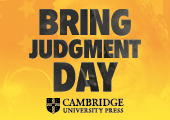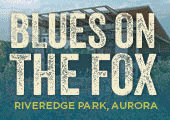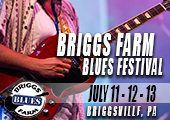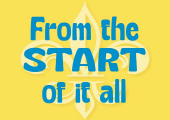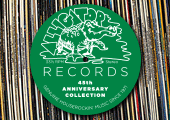ARTHUR ADAMS 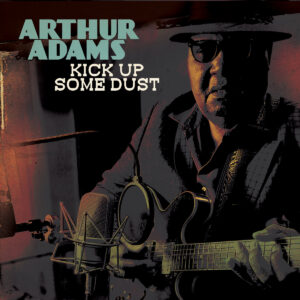
Kick Up Some Dust
Cleopatra Blues – CLO3790
Legendary author F. Scott Fitzgerald once wrote, “there are no second acts in American lives.” But Fitzgerald passed away in 1940, some three years before Arthur Adams was born in Tennessee. Adams was a touring musician while still a student; taught by his mother and inspired by heroes like Elmore James, he learned to play guitar. By his early 20s he had backed James, Chuck Berry, Lightnin’ Hopkins, and Lowell Fulson.
By the early 1960s, Adams had released singles under his own name. Moving out west to Los Angeles, he flourished as a versatile session musician, working extensively with Quincy Jones, Henry Mancini, and others. Bridging blues and soul on his own recordings, Adams released a string of albums throughout the 1970s. He later toured extensively as Nina Simone’s bassist.
But Adams went quiet after that, keeping a low profile and not releasing any new music until the tail-end of the century. But in recent years he’s returned with occasional albums of new material. His latest—and first in more than a decade—is Kick Up Some Dust. And Adams’ latest makes plain that the well of inspiration upon which he drew so often in years past is still very much in service.
Adams sings lead and plays all of the guitar on Kick Up Some Dust. Backed by a small core of musicians plus select guest players, Adams works his way through 11 original songs. His vocals are strong and clear, with phrasing and enunciation displaying more than a hint of the influence of B.B. King. And his sinewy guitar work is melodic in the extreme.
It Makes Me Mad opens the album on a strong note. The tune’s horn charts fit seamlessly into the arrangement. Starving for Your Love employs the B.B. King voice-and-guitar call-and-response approach, but Adams makes the style his own. The slinky beat, beefy horns, and well-placed ’70s soul–styled backing vocals all bring the song together.
Hense Powell’s subtle sting-synthesizer keyboard work gives Hold on to Me a romantic feel, doubling down on the song’s yearning, classic slow jam character. Adams’ guitar work is taut and economical, and his overdubbed gospel-flavored vocals are the icing on the cake.
Fly with Me to Paradise might be built around a shopworn lyrical idea, but musically, it’s another matter, subtly drawing upon a reggae feel that serves to showcase Adams’ songwriting and arranging versatility. The congas that enliven the album’s title track may remind listeners of Isaac Hayes’ early ’70s work, but the molten lead guitar carries this instrumental number; at just over three minutes, it’s over far too soon.
I Love You More is solidly romantic soul. University of Hard Knocks is loping if familiar blues, but the Dixie Hummingbirds–style backing vocals (from Kym Foley, Ava DuPree, and Jessica Taylor) elevate the song. Adams leans toward funk for Done Got Over You, and the results are pleasing. Cool as a Cucumber sounds a bit like Steely Dan; Thieves of Love slows things waaaay down and features one of Adams’ strongest vocal turns on the set.
After delivering a collection with no missteps, the record wraps up on a high note with A Bag of Soul, an instrumental with tasty layered guitars. Everything about Kick Up Some Dust suggests that Adams has plenty more tricks left in his bag.
—Bill Kopp
WILLIAM BELL
One Day Closer to Home
Wilbe Records – 2023-2
The comeback story has an enduring appeal. It has an underdog aspect that draws people in as they root for an individual’s ability to return to the glory days. Soul legend William Bell is riding high in the midst of one of those stories. Born in Memphis, he cut his first record in 1957 and was one of the first artists signed to the Stax Records (Satellite at the time), initially as a songwriter. He scored numerous soul hits, including You Don’t Miss Your Water (1961), Everybody Loves a Winner (1967), Private Number (with Judy Clay, 1968), Tryin’ to Love Two (for Mercury, 1976). Bell ensured himself a legendary position in the blues world with his co-write with Booker T. Jones of Albert King’s Born Under a Bad Sign. In 1969, he moved to Atlanta, where he still resides. By the early 1990s, his records faded from the charts, but in 2014, he was featured in the Memphis music documentary film Take Me to the River, and two years later he teamed with producer John Leventhal to make This Is Where I Live, which won a Grammy for Best Americana Album. He’s been on a roll since then and if any further proof is needed that he’s still got what it takes, it has arrived with One Day Closer to Home, co-produced by Bell and Reginald “Wizard” Jones (who also plays keyboards) for his own Wilbe Records (which he founded in 1985).
The first track, I Still Go to Parties, opens with the words “You’re never too old . . .” and that’s certainly the case with Bell. There’s not a weak track in the program of mid-tempo numbers that bring back the classic soul music sound and often feature lyrics that reveal a man reflecting on his life’s journey. And, he’s still composing solid songs seven decades on, co-writing 11 of the 12 songs. One of the highlights that reinforces his Memphis roots is In a Moment of Weakness, which features Charles Hodges on organ and Leroy Hodges on bass, two of the city’s legends in their own right, thanks to their work in the Hi Records rhythm section. It’s a lilting ballad that the singer invests with a warm, gentle heartache and an impressive falsetto leap in unison with Hodges’ organ. It can stand alongside anything that came out of Stax studios during its heyday. Other standouts include I Will Remember Tonight thanks to the sweet melodic tone of Bell’s delivery and Brag About You, a joyous rocking soul number that is enhanced by the novel use of violin filigrees to accent his vocal. The deft blues sensibility that Bell employed when he co-wrote the Albert King classic shows up on the stripped-down One Day Closer to Home with its three interlocking guitar lines and the buoyant Georgia Peach, which would have been a natural for B.B. King. Back in the day, Bell sang, “Everybody loves a winner,” and the comeback that continues with One Day Closer to Home makes it clear that’s exactly what he is.
—Robert H. Cataliotti
ERIC BIBB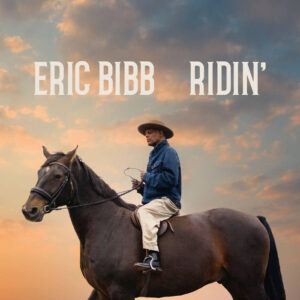
Ridin’
Stony Plain – SPCD1472
Throughout a recording career stretching back half a century now, the perennially youthful Eric Bibb has always maintained a skillful balance between celebrating the acoustic African American blues tradition and melding that with contemporary influences.
On Ridin’, Bibb and his acoustic guitar are joined by guests ranging from straight-ahead jazz guitarist Russell Malone to kindred spirits Taj Mahal and Jontavious Willis, French blues guitarist and singer Amar Sundy to Malian singer Habib Koité, soul veteran Harrison Kennedy to his own Eric Bibb String Band.
Despite the disparate lineups and stylistic range (People You Love drips old Nashville country, like something off a Clint Eastwood soundtrack), Bibb’s compositions, arrangements and, most of all, lyrics, coalesce to make this release a cohesive whole.
The title track makes clear that this outing is a paean to the civil rights movement, and a call to recapture that commitment to full equality.
If the album as a whole is often lyrically stark in its assessment of racism in the United States, the opening track, Family (a funk-infused bit of soul blues), delivers a message asking all of us to lower the tenor of our public discord: “Let’s open our eyes, call a spade a spade / Someone makin’ money by keeping us afraid / Afraid of each other / Back in time we might have been / Brothers from a different mother / They called it a sin.”
Malone joins Bibb for a jazz blues tale of John Howard Griffin, the author of Black Like Me—a book largely forgotten today, but highly influential when it came out. Bibb and Malone do a nice job of making his story highly listenable in The Ballad of John Howard Griffin, and their interplay of acoustic and electric guitars, blues, and jazz, is surprisingly organic.
Tulsa Town is a look back at the white riots against a successful Black business district in 1921, while Call Me by My Name (on which he duets with Harrison Kennedy, former singer with R&B hitmakers Chairmen of the Board) is as much a call to authentic Black patriotism as the Impressions’ This Is My Country.
Joybells is a slow, Piedmont-flavored number that recounts the victims of lynching, punctuated by Bibb’s slow, tasteful picking. Blues Funky Like Dat features Mahal and Willis on another slow blues, this one about a preacher’s son who likes his Friday night blues. And on Free, a slowly strummed folk blues, Koité not only takes a verse in the Bambara language, but introduces West African motifs to the instrumental backing as well, which lasts into the final couple of verses where the two men trade vocal passages.
The album closes out with a tremendous couple of songs, beginning with the country number People You Love about the heartache of having to let go of those who pass on before us, but finding comfort in knowing they’re still with us in spirit. The final cut, Church Bells, is a lovely instrumental piece that contains broad streaks of Celtic influences, particularly on the fiddle part.
This is a passionate and thoughtful album from Bibb. Righteously angry at times, it always rises above rancor with lyrics that are idealistic rather than judgmental. And his ability to bring Celtic, country, African, jazz, and pop influences to his acoustic blues remains impressive in its utter seamlessness.
–Jim Trageser
ALABAMA MIKE 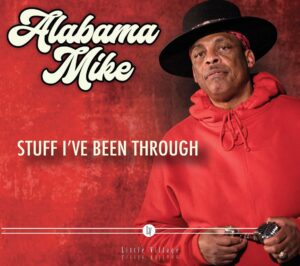
Stuff I’ve Been Through
Little Village – LVF 1053
As the saying goes, don’t judge a book—or an album—by its cover. Though the largely monochromatic photo and graphics on the cover of Stuff I’ve Been Through is pedestrian and has the feel of a rush job, the music contained within is something completely different and far superior.
The late 1960s and early 1970s were a fertile period for symphonic soul, a style of music that combined the street-level emotional intensity of classic soul with the sophisticated (and expensive) values of the modern recording studio. With the record industry of that era awash in cash, recording sessions often spared no expense employing top-level session players to deliver sweeping, ambitious arrangements. The results were often breathtaking, occasionally transcendent.
These days, the process of making an album is much closer to the bone, and recording budgets are modest. But listeners might forget all that upon hearing Stuff I’ve Been Through. The soaring, clear vocals of Alabama Mike (born Michael Benjamin) are out front where they belong, but there’s a powerful sound supporting him. Kid Andersen—who produced the album at his Greaseland Studios—is on hand to provide searing guitar work, and the other musicians are all superb, too. But what really elevates Stuff I’ve Been Through to the level of something truly special and remarkable is the “big” instrumentation. Thick and emotionally evocative strings, tight and fulsome brass: those are some of the secret ingredients that make Stuff I’ve Been Through more than just a very good record.
Another strength of the album is its variety. Fat Shame, Pt. 1 answers the unasked question, “What might Sly Stone sound like in 2023 if he hadn’t drifted off into the ether?” The tune is stuffed with humorous lyrics that underscore Alabama Mike’s skill as a songsmith. In between the laugh lines (“I’m fat / I’m lit / and you can’t tell me shit”) is an important message. If all that weren’t enough, the tune is musically alluring, too.
Jazz textures and sexy backing vocals enliven the simmering This Ain’t No Dizneyland, and the tune’s rapid-fire lyrics suggest that in a different life, Mike could have found great success as a rapper. The swaggering King Cock is as boastful (but not quite as racy) as its title suggests. The big band swings for the fences on the slow talking/singing blues of Pine Bluff, Arkansas (Big Fine Woman). While Mike sticks to vocals elsewhere on Stuff I’ve Been Through, here he lays down some tasty harmonica as well.
There’s a tiny bit of unnecessary sonic stereotyping on Woman on the Warpath, but the song itself is effective. Alabama Mike slips effortlessly into a ’70s soul crooner persona on Damage Control, and the track’s subtle instrumental and vocal backing is excellent. Fat Shame, Pt. 2 is about as essential as “part two” type tracks ever are, but it’s harmless enough, and doesn’t interrupt the album’s flow.
The record wraps with a pair of live tracks that demonstrate that for all the virtues of the studio and its players, Alabama Mike is an effective onstage performer. On Mississippi, he’s joined by Rick Estrin on harmonica (and seemingly by the entire audience on chorus vocals). And he closes the set with a benediction for that crowd, the soulful and heartfelt gospel of God Is with You. The experience of listening to Stuff I’ve Been Through is something well worth going through.
—Bill Kopp
SKYLAR ROGERS
Among the Insanity
Blue Heart Records – BHR 036
A Chicago native who headed south to take up residence in Memphis, Skylar Rogers proves that she can carve a place for herself on the contemporary blues scene with her third album, Among the Insanity. Joining forces with producer/bassist Terry Wilson, they have co-written 12 tunes that put her on a blues rock path that has been blazed by singers like Shemekia Copeland and Annika Chambers. One of the things that makes her a perfect fit for the Memphis musical milieu is the sensual, grainy burr of her voice that calls to mind Ann Peebles, one of the city’s musical icons.
Rogers and Wilson have a assembled a program with a variety of grooves that enable the singer to strut her stuff. The album opens with Love in the Left Lane, a Little Feat–inspired slide guitar and pulsing electric keyboard–driven, southern-fried funk outing. The presence of two veteran guitar men, W.G. Snuffy Walden and Billy Watts, ups the ante as their solos and support enhance what Rogers is delivering, as evidenced on the rocking shuffle Femininity. The outstanding blues rock numbers include the title track, Ride That Lightning, Blame It on Rock and Roll, and Both Sides of the Tale. Rogers shines on the crunching two-guitar, Rolling Stones–like attack of Step It Up, recalling Tina Turner classics like Steamy Windows and Overnight Sensation. On the moody ballad Between Friends, Rogers flashes a gospel-inspired passion that is enhanced by Bennett Salvay’s organ and Darrell Leonard’s trumpet. That gospel feel is melded to a spirited Caribbean beat on The Water. Her ability to effectively deliver ballads is found on One Last Kiss with its poignant guitar fills and Apology Not Accepted with its stripped-down acoustic piano accompaniment. With Among the Insanity, Skylar Rogers and Terry Wilson have crafted a solid blues rock recording that holds the promise of good things to come.
—Robert H. Cataliotti
BOB CORRITORE & FRIENDS 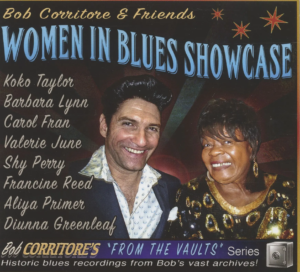
Women in Blues Showcase
SWMAF Records – SWMAF 23
Grammy Award nominee Bob Corritore has had a long and esteemed career in and around the blues. As a harmonica player, venue owner, radio show host, and multiple award winner (Living Blues Award and more), he has done a great deal to shine a light on the blues. In addition to his own deep catalog of releases featuring his music, Corritore’s record label SWMAF (Southwest Musical Arts Foundation) has titles highlighting the work of other significant artists. Just since 2020, SWMAF has released at least ten albums of new material. The latest among those is Women in Blues Showcase.
Part of Corritore’s “From the Vaults” series, this new collection brings together a dozen studio tracks, all recorded between 2001 and 2022. Half of the cuts are previously unreleased. The vocalists showcased on the set include (in alphabetical order) Carol Fran, Diunna Greenleaf, Valerie June, Barbara Lynn, Shy Perry, Aliya Primer, Francine Reed, and Koko Taylor. Those eight names offer listeners a pleasing cross-section of blues royalty (Taylor, guitarist-singer Barbara Lynn), current-day stars (Greenleaf, June), and up-and-comers (Perry).
The ladies all hold their own across this collection that mixes original compositions (like Greenleaf’s loping Be for Me) and classics (Aliya Primer’s slinky reading of Tee Ni Nee Ni Nu, Reed’s haunting reinvention of the Staple Singers’ Why Am I Treated so Bad, and more). Corritore—who co- produced the sessions with Clarke Rigsby and John Wroble in Tempe, Arizona, and Chicago—drew upon some impressive players to provide top-flight instrumental support on the sessions; guitarist Bob Margolin backs Taylor and Greenleaf.
There’s an admirable variety in texture, tone, and overall musical approach across the selections. Carol Fran’s I Just Need a Friend is soulful, subtle, and impassioned. Valerie June’s Americana-flavored blues is exemplified by her stripped-down reading of the traditional Crawdad Hole. Taylor’s outsized, raucous, and swaggering persona comes to the fore on her original What Kind of Man Is This.
Shy Perry displays guts in taking on Willie Dixon’s chestnut Wang Dang Doodle, but she handily puts her own stamp on the tune. Carol Fran digs deep into the grooves on her own statement of purpose, I Needs to Be Be’d With. Diunna Greenleaf’s take on Willie Dixon’s Don’t Mess with the Messer perfectly nails the sweet spot in which R&B and blues meet; the spirited horn charts on the tune are spot-on, too. Carol Fran ably fronts a big band arrangement on Walkin Slippin’ and Slidin’ to great effect.
Throughout the proceedings, Corritore deftly weaves his blues harp into the arrangements, always adding just the right texture, and never overplaying or taking the focus away from the featured vocalist. On one track he might lay down clean, single-note melodic lines; on another he blasts out with wonderfully distorted fury. It’s a testament to his good taste in playing and production that these disparate recordings all fit together as a cohesive whole.
—Bill Kopp
JOHN PRIMER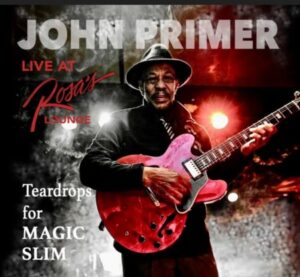
Teardrops for Magic Slim: Live at Rosa’s Lounge
BHP – JP2023
Teardrops for Magic Slim, John Primer’s tribute to his late mentor and Teardrops bandleader, Magic Slim (born Morris Holt), comes directly on the heels of his award-winning release Hard Times.
The Teardrops lineup reconstituted for Teardrops comprises former bandmembers Jon McDonald, Danny O’Connor, and Earl Howell, plus current Primer sideman Lenny Media. And appearing as a guest on two tracks is Shawn Holt, son of the late bandleader.
Slim’s gone ten years now. Lumps abound: both in the throat, as well as in the classic Chicago chugging undercurrent, known as the lump-de-lump, perfected and popularized by Primer with the Teardrops.
Recorded at Chicago’s famed Rosa’s Lounge, the set has a loose, celebratory, live club feel, with the opener, J.B. Lenoir’s Mama Talk to Your Daughter, a raucous call-and-response between band members, just as Slim was known to perform it.
The minor key, Luv Sumbody, from the late Jimmy Dawkins, sounds just right, carried along on a deep groove that perhaps best conjures a Magic Slim set.
While only one track, Trouble of My Own, was written by Magic Slim, all of these titles were in regular rotation on the Teardrops’ setlists. Slim was known for his strong and personal takes of the recordings of other Chicago blues artists. In fact, some of Slim’s powerful covers of the work of others have become associated with him, such as A.C. Reed’s Buddy Buddy Friend, a personal favorite of this writer.
The oft-covered Ain’t Doing Too Bad, first recorded by Bobby Bland, is enjoyably faithful to Slim’s mid-tempo shuffle version of it.
On the terrific slow burner take of Jimmy McCracklin’s Every Day, Every Night, Primer’s vocal phrasing of “ain’t it nice” seems to echo Muddy Waters’ “ain’t it sad” from You Can’t Lose What You Ain’t Never Had, as sung by Primer’s other mentor.
Between songs, in a nice touch, Primer throws in a few of the vocal asides Slim was known for, “And you know that’s right!” and, “If you come by yourself, you leave by yourself.”
The set concludes with Little Milton’s The Blues Is Alright, an anthem often overdone by others, but always forgivable from Magic Slim . . . and John Primer.
—Justin O’Brien
IVAN NEVILLE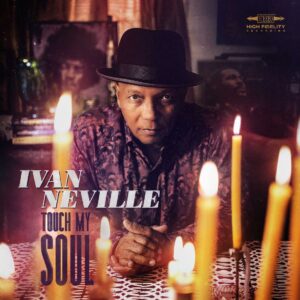
Touch My Soul
Funk Garage – TFG76982
The novelist and blues scholar Albert Murray articulated the concept of an “ancestral imperative,” the onus on each successive generation to build upon and advance the efforts of previous generations. Back in 1988, keyboard player and singer Ivan Neville must have had an inherent understanding of that concept when he released his debut album, If My Ancestors Could See Me Now. Three and a half decades later, Neville has genuinely come into his own as an artist with Touch My Soul, his fifth solo album and first since Scrape (2004). He cut his musical teeth alongside his father, Aaron, and uncles Art, Charles, and Cyril in the Neville Brothers band and matured as an artist working as a sideman for artists like Bonnie Raitt, the Rolling Stones, Keith Richards, and the Spin Doctors, as well as continuing to lead the New Orleans funk powerhouse Dumpstaphunk. Last year’s outstanding Dumpstaphunk album Where Do We Go from Here saw Neville and his cohorts reaching back to the past to the foundations of funk in the early 1970s and recasting those roots with a dynamic, contemporary sound that paves the way for the future of the music. With Touch My Soul, he carries on that effort but moves beyond the dedication to funk, revealing a broader musical vision. This is evident in the mellow mid-tempo soul of Hey All Together with its call and response with a chorus that features his father, Raitt, Michael McDonald, and David Shaw. The pulsing Might Last a Lifetime brings to mind the Marvin Gaye of What’s Goin’ On. With Charley Drayton’s heartbeat bass drum providing a compelling underpinning, the title track is a ballad that lets Neville’s voice soar amidst the swirl of electronic strings and Troy “Trombone Shorty” Andrews’ trumpet.
The funk is in his DNA, and it’s here too. Dance Music Love, which could easily fit in on an early Neville Brothers LP, features percolating polyrhythms with Neville on bass dueling with Doyle Bramhall II’s shredder guitar. The second line extravaganza Greatest Place on Earth features Andrews, along with other horn players like Preservation Hall’s Ben Jaffe on tuba and octogenarian Charlie Gabriel on clarinet, and it’s likely to become another self-reflexive Crescent City party classic. Stand for Something reflects Dumpstaphunk’s hard-driving funk (especially thanks to that band’s bassist Tony Hall’s monster groove) coupled with their social consciousness message.
Neville wraps the whole thing up by going in a totally different direction with Blessed, a lovely solo acoustic piano instrumental meditation. If Ivan Neville’s ancestors could see him now (and Uncle Cyril still does work alongside him often), they would genuinely be proud of where he stands with Touch My Soul.
—Robert H. Cataliotti
FRED DAVIS AND THE BLUES EXPRESS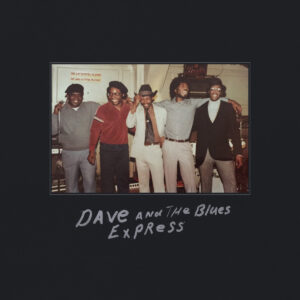
Cleveland Blues
Colemine – BMND-12004
Little is known about Fred “Dave” Davis. What we do know comes from public records and a couple of his young white friends who worked at the same Cleveland factory as Davis during their college summer breaks. There they learned that their new friend was the son of Arkansas sharecroppers who had ended up in Cleveland after serving time in a Missouri prison on a drug conviction. What most interested Davis’ new friends, however, was that he was a skilled guitarist, pianist, and singer who aspired to be a professional musician but instead, for the time being, taught young proteges a thing or two about the guitar.
If matters had gone no further, Fred Davis would have remained an unknown, but in recent times a long-abandoned tape recording surfaced and has been prepared for release by Cleveland-based Colemine Records. The CD is made up of 11 tracks, some with amplification and others not, that reveal similarities in Davis’ music to that of his contemporaries in such places as Chicago, Texas, and California. His high-pitched vocals are particularly effective when supported by a combination of crisp single-note runs and more complex chording. The program contains several, mostly up-tempo, instrumentals (one on piano), covers of Charles Brown and Eddie Boyd, and a handful of Davis originals that reveal influences from Bobby Bland, T-Bone Walker, and J.B. Lenoir.
His best advice, though, was short, simple and too seldom heeded: don’t play too loud and don’t play too fast.
Could Fred Davis have been a success if he had gotten off the bus in Chicago or Detroit rather than Cleveland, or if he had slipped into the stream of college gigs? Of course we will never know, but this tape provides evidence that the talent was there.
—Jim DeKoster
BIG HARP GEORGE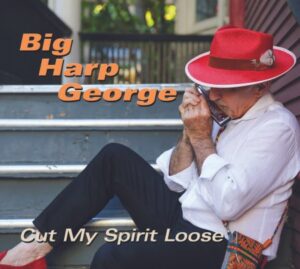
Cut My Spirit Loose
Blues Mountain Records – MNR CD05
Since his 2014 debut, Chromaticism, San Francisco Bay Area bluesman Big Harp George (George Bisharat) has carved out a niche as an acerbic songwriter and a master of the chromatic harmonica. Recorded at Kid Andersen’s Greaseland Studios, George’s latest release, Cut My Spirit Loose, finds his talent in top form. Even with Andersen on guitar, Chris Burns on keyboards, the Sons of the Soul Revivers on background vocals, and an array of horn players, George’s deft harmonica chops and unique tenor voice always take center stage.
Opening track It’s Tuesday sets the mood perfectly. The high-energy jump blues tune is buffed up by Michael Peloquin’s horn arrangements and Andersen’s deft guitar work. Wry lyrics about life during the COVID lockdown, when taking out the trash was the week’s biggest social event, demonstrate that George’s wit is sharp as ever. Given all the musical muscle that was assembled in the studio, it’s not surprising that the album’s instrumental tracks are outstanding. The second-line rhythms of Bustin’ Out take listeners down to the Big Easy, while Mike Rinta’s tuba and Derrick D’Mar Martin’s percussion thicken the gumbo. The interplay between George’s melodic harmonica lines and the horn section is a delight. Tasty drum breaks from Martin and background vocals from James Dwayne and Walter Morgan add to the swing of Jump Abu Lula.
A former criminal defense attorney and law professor, George excels at satire and social commentary. The self-deprecating humor of Prince of Downward Mobility will resonate with listeners frustrated with inflation and tough times. On Rantytown, George’s wit is razor-sharp as he takes gleeful potshots at internet-addicted conspiracy theorists. His voice drips with sass as he sings, “FBI, CIA, they’re all after you / CNN, MTV, they’re in on it, too!” The mood shifts to heartfelt sincerity on Take a Knee. As George passionately takes a stand against war and racism, Andersen’s acoustic guitar and backing vocals from Dwayne and Morgan provide a solemn backdrop.
Creativity and stellar musicianship run through every track on Cut My Spirit Loose. Big Harp George’s unique and eminently soulful music belongs on the playlist of every blues fan.
—Jon Kleinman


